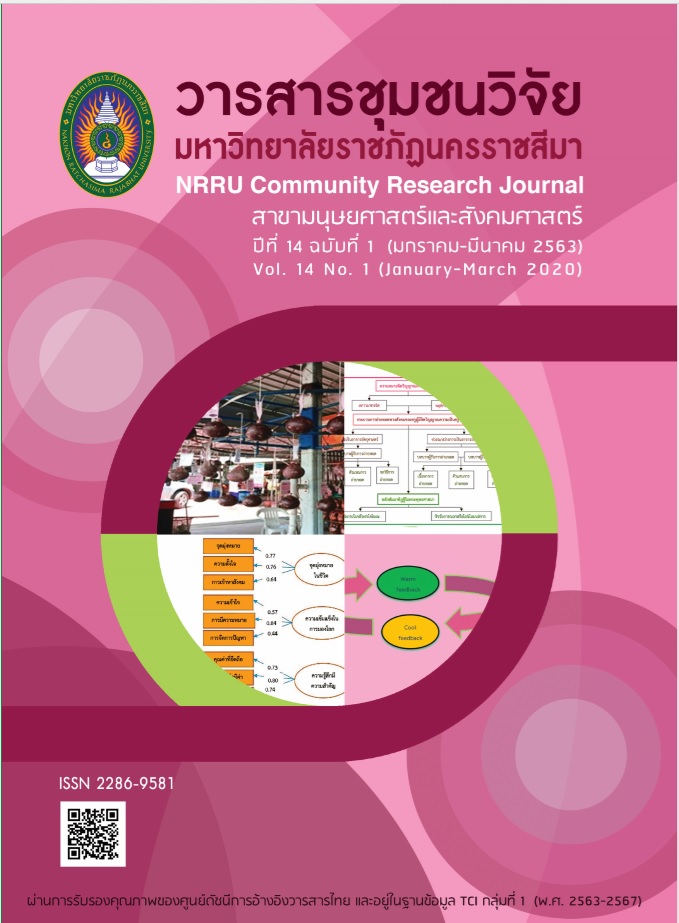การเปรียบเทียบผลสัมฤทธิ์ทางการเรียนและทักษะการสื่อสารและการนำเสนอ ของนักศึกษาระดับปริญญาตรีโดยใช้วิธีการสอนแบบสืบเสาะหาความรู้ 5E กับวิธีการสอนโดยใช้ปรากฏการณ์เป็นฐาน
DOI:
https://doi.org/10.14456/nrru-rdi.2020.3คำสำคัญ:
การเรียนรู้แบบสืบเสาะหาความรู้ (5E), การสอนโดยใช้ปรากฏการณ์เป็นฐาน, ทักษะการสื่อสารและการนำเสนอบทคัดย่อ
การวิจัยครั้งนี้มีวัตถุประสงค์เพื่อ 1) เปรียบเทียบผลสัมฤทธิ์ทางการเรียนของนักศึกษาหลังเรียนโดยใช้วิธีการสอนแบบสืบเสาะหาความรู้ 5E กับเกณฑ์ร้อยละ 70, 2) เปรียบเทียบผลสัมฤทธิ์ทางการเรียนของนักศึกษาหลังเรียนโดยใช้วิธีการสอนโดยใช้ปรากฏการณ์เป็นฐานกับเกณฑ์ร้อยละ 70, 3) เปรียบเทียบผลสัมฤทธิ์ทางการเรียนหลังเรียนของนักศึกษาที่เรียนรู้ด้วยวิธีการสอนแบบสืบเสาะหาความรู้ 5E และนักศึกษาที่เรียนรู้ด้วยวิธีการสอนโดยใช้ปรากฏการณ์เป็นฐาน, 4) เปรียบเทียบทักษะการสื่อสารและการนำเสนอระหว่างก่อนเรียนและหลังเรียนของนักศึกษาที่เรียนรู้ด้วยวิธีการสอนแบบสืบเสาะหาความรู้ 5E, 5) เปรียบเทียบทักษะการสื่อสารและการนำเสนอระหว่างก่อนเรียนและหลังเรียนของนักศึกษาที่เรียนรู้ด้วยวิธีการสอนโดยใช้ปรากฏการณ์เป็นฐาน และ 6) เปรียบเทียบทักษะการสื่อสารและการนำเสนอหลังเรียนของนักศึกษาที่เรียนรู้ด้วยวิธีการสอนแบบสืบเสาะหาความรู้ 5E และนักศึกษาที่เรียนรู้ด้วยวิธีการสอนโดยใช้ปรากฏการณ์เป็นฐาน กลุ่มตัวอย่างเป็นนักศึกษาระดับปริญญาตรี ชั้นปีที่ 3 สาขาฟิสิกส์ จำนวน 25 คน และสาขาวิทยาศาสตร์ทั่วไป จำนวน 28 คน ที่ลงทะเบียนเรียนในรายวิชาการออกแบบและการจัดการเรียนรู้ ในภาคเรียนที่ 1 ปีการศึกษา 2562 โดยวิธีการสุ่มแบบแบ่งกลุ่ม เครื่องมือที่ใช้ในการวิจัยได้แก่ แผนการจัดการเรียนรู้ จำนวน 4 แผน เครื่องมือที่ใช้ในการเก็บรวบรวมข้อมูล ได้แก่ แบบทดสอบวัดผลสัมฤทธิ์ทางการเรียน จำนวน 80 ข้อโดยมีค่า IOC อยู่ระหว่าง 0.67-1.00 ค่า P อยู่ระหว่าง 0.24-0.75 ค่า R อยู่ระหว่าง 0.31-0.84 และค่า KR-20 เท่ากับ 0.92 ส่วนแบบประเมินทักษะการสื่อสารและการนำเสนอมีค่าสัมประสิทธิ์อัลฟาเท่ากับ 0.88 สถิติที่ใช้ในการวิจัย ได้แก่ ค่าร้อยละ ค่าเฉลี่ย ส่วนเบี่ยงเบนมาตรฐาน ทดสอบค่าที (t-test)
ผลการวิจัย พบว่า 1) ผลสัมฤทธิ์ทางการเรียนของนักศึกษาหลังการจัดการเรียนรู้แบบสืบเสาะหาความรู้ 5E ต่ำกว่าเกณฑ์ร้อยละ 70 ที่ระดับนัยสำคัญทางสถิติที่ระดับ .05 2) ผลสัมฤทธิ์ทางการเรียนของนักศึกษาหลังการจัด การเรียนรู้โดยใช้ปรากฏการณ์เป็นฐานต่ำกว่าเกณฑ์ร้อยละ 70 ที่ระดับนัยสำคัญทางสถิติที่ระดับ 0.05 3) ผลสัมฤทธิ์ทางการเรียนหลังเรียนของนักศึกษาที่เรียนด้วยวิธีการสอนแบบสืบเสาะหาความรู้ 5E ไม่แตกต่างจากผลสัมฤทธิ์ทางการเรียนหลังเรียนของนักศึกษาที่เรียนด้วยวิธีการสอนโดยใช้ปรากฏการณ์เป็นฐาน ที่ระดับนัยสำคัญทางสถิติที่ระดับ 0.05 4) ทักษะการสื่อสารและการนำเสนอของนักศึกษาหลังการจัดการเรียนรู้แบบสืบเสาะหาความรู้ 5E สูงกว่าก่อนการจัดการเรียนรู้ อย่างนัยสำคัญทางสถิติที่ระดับ 0.05 ทั้งในภาพรวมและรายด้าน 5) ทักษะการสื่อสารและการนำเสนอของนักศึกษาหลังการจัดการเรียนรู้โดยใช้วิธีการสอนปรากฏการณ์เป็นฐานสูงกว่าก่อนการจัดการเรียนรู้ อย่างนัยสำคัญทางสถิติ ที่ระดับ 0.05 ทั้งในภาพรวมและรายด้าน และ 6) คะแนนเฉลี่ยทักษะการสื่อสารและการนำเสนอหลังเรียนของนักศึกษาที่เรียนด้วยวิธีการสอนแบบสืบเสาะหาความรู้ 5E แตกต่างจากคะแนนเฉลี่ยทักษะการสื่อสารและ การนำเสนอหลังเรียนที่เรียนด้วยวิธีการสอนโดยใช้ปรากฏการณ์เป็นฐานอย่างมีนัยสำคัญทางสถิติที่ระดับ 0.05
เอกสารอ้างอิง
Butkatunyoo, O. (2018). Phenomenon-Based Learning for Developing a Learner’s Holistic Views and Engaging in the Real World. Journal of Education Studies, 46(2), 352. (In Thai)
Bybee, R. B., & Others. (2006). The BSCS 5E Instructional Model: Original and Effectiveness. Retrieved September 5, 2019 from https://media.bscs.org/bscsmw/5es/bscs_5e_full_ report.pdf
Chamchoy, S. (2018). The School Management in Digital Age. Bangkok : Chulalongkorn University Press. (In Thai)
Dachakupt, P., & Yindeesuk, P. (2018). The 7C’s Skills of Teacher in 4.0 Era, PLC & Log Book (4th ed.). Bangkok : Chulalongkorn University Press. (In Thai)
Justice, C., & Others. (2007). Inquiry in Higher Education: Reflections and Directions on Course Design and Teaching Methods. Innov High Educ, 31, 212-213.
Keeratichamroen, W., & Kittisuntorn, C. (2016). A Study of 21st Century Learning Skills of Undergraduate Students on Learning Design and Instructional Management Course Using Big Five Learning. NRRU Community Research Journal, 10(3), 9-19. (In Thai)
Keeratichamroen, W., Dechsri, P., Panijpan, B., & Ruenwongsa, P. (2010). Enhancing student conceptualization of a combustion chemical reaction using the Tapioca Bomb activity : an inquiry-based approach. International Journal of Learning, 17(1), 275-292. (In Thai)
Khammanee, T. (2016). Pedagogy: The Body of Knowledge for Effective Learning Process Management (20th ed.). Bangkok : Chulalongkorn University Press. (In Thai)
Marsh, D., Perez, W. D., & Morales, M. E. (2019). Enhancing Language Awareness and Competence-Building through a Fusion of Phenomenon-Based Learning and Content and Language Integration. Journal of e-Learning and Knowledge Society, 15(1), 62.
Naik, R. P. (2019). Phenomenon-Based Learning in Finland. Retrieved November 16, 2019 from https://jyx.jyu.fi/bitstream/handle/123456789/64611/URN%3ANBN%3Afi%3Ajyu-201906143197 .pdf?sequence=1
Nuangchalerm, P. (2015). Science Teaching in the 21st Century. Bangkok : Chulalongkorn University Printing House. (In Thai)
Panit, W. (2012). How to Create Learning for Students in the 21st Century. Bangkok : Sodsri-Saritwong Foundation. (In Thai)
Sarabut, R, Julsiripong, S., & Keeratichamroen, W. (2014). Learning achievement, Science process skills and scientific mind of matthayomsuksa 5 students by inquiry cycle learning management. Ratchaphruek Journal, 12(2), 70-76. (In Thai)
Sinlarat, P., & Others. (2017). Being Teacher and Professional Teacher Development. Bangkok : Chulalongkorn University Press. (In Thai)
Symeonidis, V., & Schwarz, J. F. (2016). Phenomenon-Based Teaching and Learning through the Pedagogical Lenses of Phenomenology: The Recent Curriculum Reform in Finland. Forum Os/wiatowe, 28(2), 36-37.
Tanya, S. (2012). Educational Research Methodology. Nakhon Ratchasima : Nakhon Ratchasima Rajabhat University. (In Thai)
Uchuphap, P. (2018). Education and Teaching Profession. Bangkok : Chulalongkorn University Press. (In Thai)
Valanne, E., & Others. (2017). Phenomenon-Based Learning Implemented in Abu Dhabi School Model. International Journal of Humanities and Social Sciences, 9(3), 1-17.
Wakil, K. & Others. (2019). Phenomenon-Based Learning for Teaching ICT Subject through other Subjects in Primary Schools. Journal of Computer and Education Research, 7(13), 205-212.
Wipawin, N. (2010). Knowledge and Innovation: The Experiences from Finland. Retrieved November 22, 2019, from https://www.rpu.ac.th/Library_web/doc/e-book_T/Tampere%20University.pdf (In Thai)





